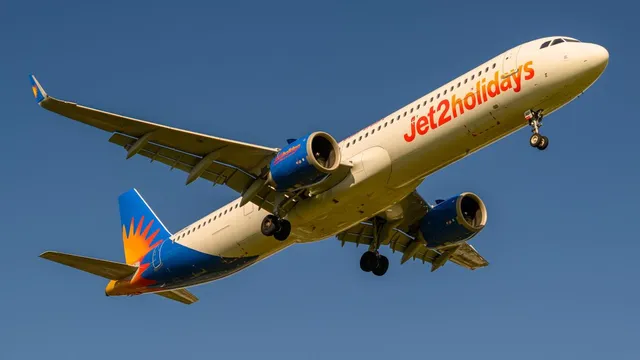
Jet2 faces profit squeeze from rising costs and late-booking trend
2025-02-19 17:24- Jet2 is facing increased operational costs including £45 million from government decisions and delays in aircraft deliveries.
- The company anticipates £20 million in added costs for sustainable aviation fuel requirements, exacerbating financial pressure.
- Despite these challenges, Jet2 expects a pre-tax profit increase for the fiscal year, although profit margins are under threat.
Express your sentiment!
Insights
In the UK, Jet2, a prominent package holiday provider and airline, has reported significant pressures on its profit margins due to rising operational costs. The company is facing a total of £45 million in additional overheads from governmental actions, alongside costs driven by inflation affecting hotel accommodation and aircraft maintenance. The delay in the delivery of new Airbus A321neo aircraft is leading to further financial strain as they attempt to mitigate gaps in their fleet during the peak summer months. Additionally, Jet2 anticipates incurring an extra £20 million to comply with new sustainable aviation fuel requirements. The CEO, Steve Heapy, acknowledged the changing landscape of consumer behavior and indicated that bookings are increasingly made closer to the travel dates, causing concern over delayed revenue recognition. As a result, Jet2 is bracing for economic conditions that may challenge customer spending habits, forcing them to rethink profit forecasts for the forthcoming year. Despite these challenges, Jet2 has reported a hopeful outlook, estimating a pre-tax profit between £560 million and £570 million for the fiscal year ending in March, 2025, suggesting a year-on-year increase. Bookings in the months of April through June also appear to be healthy, rising approximately 7% compared to the previous year, with flight-only passengers seeing an impressive 19% increase. However, these positive signs must be viewed within the context of overall cost increases and rising consumer caution. Jet2's expansion to airports such as London Luton and Bournemouth has been pivotal in generating growth and boosting bookings, though it's anticipated that these new bases will incur losses in their first operational year. The company is aware that maintaining competitive pricing, while facing rising costs, presents a real challenge ahead, as profitability and customer expectations must be balanced during this turbulent time for consumer travel.
Contexts
The airline industry has faced significant challenges in recent years, particularly due to rising operational costs that have put pressure on profitability and overall efficiency. Factors contributing to these escalating costs include fuel price volatility, labor expenses, and regulatory compliance demands. Fuel prices, which are notoriously unpredictable, can vary widely due to geopolitical tensions, natural disasters, and shifts in supply and demand. Consequently, airlines must employ strategies such as fuel hedging or investing in more fuel-efficient aircraft to mitigate these risks. Labor costs, on the other hand, represent another area of concern, as airlines must compete for skilled workforce while also adhering to labor regulations and union negotiations that contribute to overall increases in expenditures. Lastly, regulatory compliance, especially in the wake of increased security measures and environmental regulations, has necessitated additional spending in both operational and capital investments to ensure safety and sustainability within the industry. The impact of these rising operational costs is multifaceted, affecting everything from ticket prices to service levels. Airlines often pass on the burden of increased costs to consumers through higher fares, leading to reduced demand during critical travel seasons. This cycle can exacerbate financial challenges, especially for budget carriers that operate on thin margins. Moreover, airlines may be forced to reduce flight frequencies or even discontinue less profitable routes entirely, which can lead to decreased connectivity for travelers. With increasing competition from low-cost carriers and alternative transportation options, traditional airlines are finding it increasingly crucial to maintain a balance between cost management and service quality to retain market share. In response to these pressures, many airlines have begun to innovate and streamline operations to enhance efficiency and cut unnecessary costs. Investments in technology, such as advanced booking systems and revenue management software, can provide valuable insights that help airlines optimize pricing strategies and operational schedules. Additionally, by adopting airport partnerships and enhancing loyalty programs, airlines can improve customer retention while creating more stable revenue streams. Sustainable practices, such as incorporating alternative fuels and reducing carbon footprints, not only align with global environmental trends but can also result in long-term cost savings as regulations surrounding emissions tighten. As the aviation landscape continues to evolve amidst rising operational costs, it is paramount for stakeholders—ranging from airline executives to policymakers—to remain vigilant and adaptive to changing market dynamics. Understanding and addressing the factors contributing to operational costs will not only allow airlines to maintain profitability but also ensure that they can continue to meet consumer demand for air travel in a world that is increasingly interconnected. Therefore, an ongoing focus on innovation, efficiency, and strategic partnerships will be essential for navigating the complexities of rising costs in the airline industry.